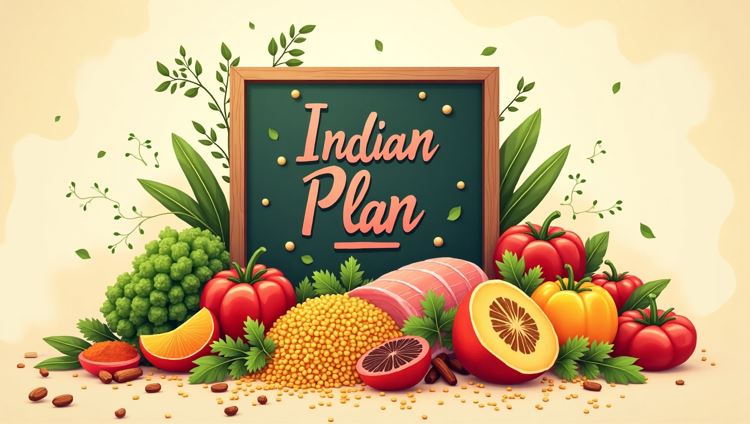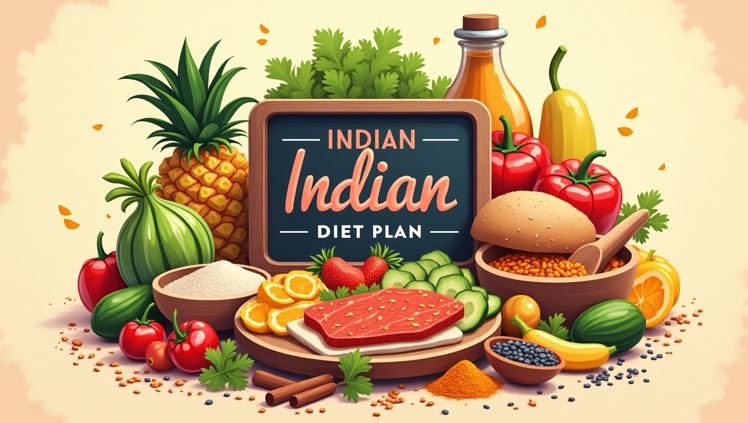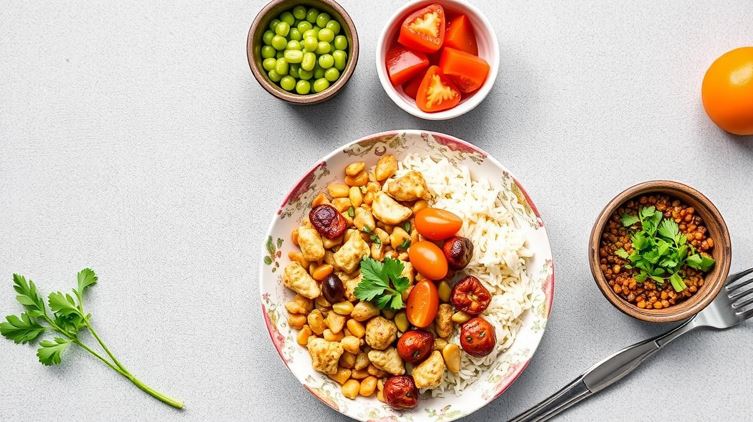Discover the Secret to Sustainable Indian Diet Plan for Weight Loss
Weight loss doesn’t have to mean giving up the food you love or sacrificing flavor for results. If you’re tired of bland diets that don’t work, it’s time to embrace an Indian diet plan for weight loss—rich in vibrant spices, diverse ingredients, and balanced nutrition.
Rooted in Ayurveda and modern science, Indian cuisine offers an ideal mix of healthy carbohydrates, lean proteins, and essential fats to help you shed those extra pounds while staying energized and satisfied. The best part? You can enjoy the delicious comfort of dishes like dal, sabzi, and roti while still working toward your fitness goals.

This isn’t about quick fixes or extreme restrictions. An Indian diet plan prioritizes sustainable weight loss by focusing on whole foods, portion control, and the nutritional wisdom passed down for generations.
Whether you’re a vegetarian, vegan, or enjoy non-vegetarian meals, there’s something for everyone. In this article, we’ll guide you through a customizable Indian diet plan that’s easy to follow and packed with flavors you’ll love.
Ready to transform your health without giving up on your favorite dishes? Let’s dive in and uncover how the magic of Indian cuisine can help you achieve your weight loss goals!
Importance of a Diet Plan for Weight Loss
- Calorie Control: Helps create a calorie deficit, which is essential for shedding excess weight.
- Balanced Nutrition: Ensures the body receives essential nutrients to function efficiently while burning fat.
- Boosts Metabolism: Eating small, frequent meals and incorporating protein-rich foods can enhance metabolic rate.
- Prevents Overeating: Planned meals reduce cravings and emotional eating, keeping hunger in check.
- Sustainable Weight Loss: Encourages healthy habits instead of quick fixes, leading to long-term weight management.
- Improves Digestion: Fiber-rich foods aid digestion and prevent bloating, keeping the gut healthy.
- Increases Energy Levels: A well-balanced diet prevents fatigue, keeping you active and motivated for workouts.

A diet plan, when combined with regular exercise and a healthy lifestyle, is the key to achieving and maintaining a healthy weight. The focus should be on consistency, portion control, and mindful eating rather than extreme dieting.
7-day Indian diet plan for weight loss
Here’s a 7-day Indian diet plan for weight loss, focusing on balanced nutrition while keeping it delicious and sustainable. This plan includes high-fiber foods, lean proteins, and healthy fats while avoiding excess sugar and refined carbs.
Guidelines for Weight Loss:
✅ Portion Control – Eat small, frequent meals.
✅ Hydration – Drink at least 2.5–3 liters of water daily.
✅ Protein-Rich Foods – Include lentils, paneer, eggs, chicken, fish, and yogurt.
✅ Fiber-Rich Foods – Eat more vegetables, fruits, and whole grains.
✅ Healthy Fats – Include nuts, seeds, ghee (in moderation), and cold-pressed oils.
Day 1 (Balanced Start)
🥛 Morning (6–7 AM) – Warm lemon water + soaked almonds (5)
🍲 Breakfast (8–9 AM) – Vegetable oats upma + curd
🍎 Mid-Morning Snack (11 AM) – 1 fruit (apple/orange) + green tea
🍛 Lunch (1–2 PM) – 2 rotis + dal + sabzi + salad
☕ Evening Snack (4–5 PM) – Handful of roasted makhana + buttermilk
🍲 Dinner (7–8 PM) – Vegetable soup + grilled paneer + stir-fried veggies
Day 2 (Protein-Packed)
🥛 Morning – Jeera water + walnuts (3)
🍳 Breakfast – Moong dal chilla + mint chutney
🍇 Mid-Morning Snack – 1 fruit (papaya/pear) + herbal tea
🍛 Lunch – Brown rice + rajma + cucumber salad
☕ Evening Snack – Handful of peanuts + coconut water
🍲 Dinner – Quinoa khichdi + curd + sautéed spinach
Also Read: How to look more younger:Naturally
Day 3 (Fiber-Focused)
🥛 Morning – Warm water + flaxseeds (1 tsp)
🥪 Breakfast – Besan chilla + curd
🍊 Mid-Morning Snack – 1 banana + green tea
🍛 Lunch – Bajra roti + bhindi sabzi + dal
☕ Evening Snack – Sprouts chaat + lemon water
🍲 Dinner – Bottle gourd soup + grilled tofu
Day 4 (Light & Energizing)
🥛 Morning – Ginger lemon water + chia seeds (1 tsp)
🍞 Breakfast – Poha with peanuts + coconut water
🍎 Mid-Morning Snack – 1 fruit (guava/apple)
🍛 Lunch – Quinoa + sambar + mixed veg salad
☕ Evening Snack – Roasted chana + green tea
🍲 Dinner – Grilled fish/tofu + stir-fried vegetables

Day 5 (Low-Carb & High-Protein)
🥛 Morning – Apple cider vinegar water
🍳 Breakfast – Scrambled eggs with whole wheat toast
🍇 Mid-Morning Snack – 1 handful of nuts + buttermilk
🍛 Lunch – 2 rotis + paneer bhurji + cucumber raita
☕ Evening Snack – Hummus with carrot sticks
🍲 Dinner – Palak soup + grilled chicken + sautéed mushrooms
Day 6 (Detox & Refresh)
🥛 Morning – Tulsi water + soaked almonds
🥗 Breakfast – Fruit smoothie with chia seeds
🍎 Mid-Morning Snack – 1 fruit + green tea
🍛 Lunch – Brown rice + dal tadka + cabbage sabzi
☕ Evening Snack – Handful of fox nuts + coconut water
🍲 Dinner – Lauki soup + steamed sprouts
Day 7 (Balanced & Nourishing)
🥛 Morning – Cucumber detox water
🥪 Breakfast – Whole wheat veg sandwich + green chutney
🍊 Mid-Morning Snack – 1 orange + green tea
🍛 Lunch – Bajra roti + chole + carrot salad
☕ Evening Snack – Greek yogurt with flaxseeds
🍲 Dinner – Mixed vegetable soup + grilled paneer
Additional Tips for Weight Loss:
✅ Avoid processed foods – No refined sugar, junk food, or fried items.
✅ Exercise daily – Walk 30–45 minutes, do yoga or strength training.
✅ Eat early dinner – At least 2–3 hours before bedtime.
✅ Chew slowly – Helps with digestion and prevents overeating.
Conclusion:Indian Diet Plan for Weight Loss
A well-planned diet is the foundation of healthy and sustainable weight loss. It focuses on balanced nutrition, portion control, and mindful eating while ensuring the body gets essential nutrients. By incorporating fiber-rich foods, lean proteins, healthy fats, and proper hydration, a diet plan helps boost metabolism, improve digestion, and prevent overeating.
Unlike extreme diets that offer quick but temporary results, a structured and realistic meal plan supports long-term weight management.
Following a healthy diet along with regular exercise ensures not just weight loss but also overall well-being. It prevents lifestyle diseases like obesity, diabetes, and heart issues. The key is to stay consistent, avoid processed foods, and listen to your body’s needs.
By making sustainable food choices and maintaining an active lifestyle, weight loss becomes an achievable and lasting goal. The focus should always be on health, not just numbers on the scale.
Questions & Answers on Indian Diet Plan for Weight Loss
1. What is a diet plan, and why is it important for weight loss?
A diet plan is a structured eating routine that helps individuals consume balanced nutrition while controlling calorie intake. It is important for weight loss because it helps create a calorie deficit, boosts metabolism, prevents overeating, and promotes healthy food choices. A well-planned diet ensures sustainable weight loss without compromising essential nutrients.
2. What are the key components of an effective weight loss diet plan?
An effective weight loss diet plan includes:
- Balanced macronutrients (carbohydrates, proteins, and healthy fats)
- High-fiber foods (vegetables, fruits, whole grains)
- Lean proteins (eggs, fish, chicken, paneer, lentils)
- Hydration (at least 2.5–3 liters of water daily)
- Portion control and meal timing to avoid overeating
3. How does a diet plan help in long-term weight management?
A well-structured diet plan encourages healthy eating habits, prevents excessive calorie intake, and helps maintain a steady metabolism. Unlike crash diets, which lead to temporary weight loss, a sustainable plan ensures long-term results by promoting a balanced lifestyle, mindful eating, and proper nutrition.
4. Can I lose weight without following a strict diet plan?
Yes, but it may be challenging. While exercise and an active lifestyle contribute to weight loss, maintaining a nutrient-dense, portion-controlled diet is essential. Without a proper diet plan, one might consume excess calories, slowing down weight loss progress.
5. What are common mistakes to avoid while following a diet plan?
- Skipping meals, leading to hunger pangs and overeating later.
- Relying on fad diets that eliminate essential food groups.
- Not drinking enough water, which affects metabolism.
- Eating processed and junk food, leading to weight gain.
- Ignoring portion sizes, even when eating healthy foods.


